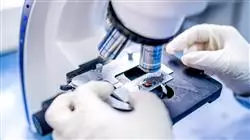University certificate
The world's largest faculty of pharmacy”
Introduction to the Program
With the Professional master’s degree in Clinical Infectious Diseases and Antibiotic Therapeutics, you have the opportunity to expand your knowledge comfortably and without sacrificing scientific accuracy, in order to incorporate the latest advances in the approach to infectious diseases into your daily medical practice”

The complex international epidemiological situation so far this century, highlights the unprecedented need to improve the process of training and development of human capital, in order to increase the competence and performance of all pharmaceutical personnel required to meet the challenges involved in controlling and dealing with biological, hospital and public health emergencies, and that guarantee the quality and safety of health care for the population in any part of the world. This has been exemplified by the deliberate release of Bacillus anthracis spores as a weapon of bioterrorism to cause pulmonary anthrax in victims who inhaled them, the emergence of West Nile virus as a pathogen in the United States, the epidemic of Severe Acute Respiratory Syndrome (SARS), the zoonotic spread of monkeypox in the United States, the threat of pandemic influenza, the Ebola epidemic in Africa, the emergence of yellow fever cases in Angola, coupled with the re-emergence of dengue and cholera, the emergence of new arboviruses in the Americas region, such as Chikingunya and more recently Zika, as well as morbidity from other endemic infectious diseases, such as HIV/AIDS, leptospirosis, tuberculosis, community-acquired pneumonia and the increase in antibiotic resistance with the development of multidrug-resistant bacteria.
The program in Clinical Infectious Diseases and Antibiotic Therapeutics is aimed at increasing the scientific education of pharmacy personnel related to research and issuing of the correct and timely treatment for infectious diseases. The program has a predominantly vocational focus, which favors the acquisition and development of knowledge and skills that will determine an improvement in the quality of pharmaceutical care of patients with infectious diseases, resulting in better morbidity and mortality rates for these pathologies in the population.
Seize the moment and gain up-to-date knowledge on the management of infections and become a renowned pharmacist”
This Professional master’s degree in Clinical Infectious Diseases and Antibiotic Therapeutics contains the most complete and up-to-date scientific program on the market. The most important features include:
- The development of case studies presented by experts in Clinical Infectious Diseases and Antibiotic Therapeutics
- The graphic, schematic, and practical contents with which they are created provide scientific and practical information on the disciplines that are essential for professional practice
- The latest developments in Clinical Infectious Diseases and Antibiotic Therapeutics
- Practical exercises where the self-assessment process can be carried out to improve learning
- An algorithm-based interactive learning system for decision-making in the clinical situations presented throughout the course.
- Theoretical lessons, questions to the expert, debate forums on controversial topics, and individual reflection assignments
- Content that is accessible from any fixed or portable device with an Internet connection
This program is the best investment you can make in a specialization for two reasons: you will obtain a Professional master’s degree from the largest digital university in the world, TECH, and you will acquire the best and most up-to-date training in Clinical Infectious Diseases and Antibiotic Therapeutics”
Its teaching staff is made up of prestigious and renowned professionals with a long career in health care, teaching and research, who have worked in many countries on several continents, developing professional and teaching experience that they deliver in an extraordinary way in this program.
The methodological design is developed by a multidisciplinary team of experts in e-Learning, who integrate the latest advances in educational technology for the creation of numerous multimedia educational tools that allow the professional to face real problems in their daily clinical practice, which will allow the acquisition of knowledge and the development of skills that will impact their future professional work.
It should be noted that each of the contents generated, as well as the videos, self-tests, clinical cases and modular exams have been thoroughly reviewed, updated and integrated by the professors and the team of experts that make up the working group, in order to facilitate the learning process in an educational and phased manner to achieve the objectives of the program.
This up-to-date program is the best on the educational landscape in infectious diseases and pharmaceuticals”

Learn about the latest scientific evidence on infectious diseases at the pharmaceutical level"
Why study at TECH?
TECH is the world’s largest online university. With an impressive catalog of more than 14,000 university programs available in 11 languages, it is positioned as a leader in employability, with a 99% job placement rate. In addition, it relies on an enormous faculty of more than 6,000 professors of the highest international renown.

Study at the world's largest online university and guarantee your professional success. The future starts at TECH”
The world’s best online university according to FORBES
The prestigious Forbes magazine, specialized in business and finance, has highlighted TECH as “the world's best online university” This is what they have recently stated in an article in their digital edition in which they echo the success story of this institution, “thanks to the academic offer it provides, the selection of its teaching staff, and an innovative learning method aimed at educating the professionals of the future”
A revolutionary study method, a cutting-edge faculty and a practical focus: the key to TECH's success.
The most complete study plans on the university scene
TECH offers the most complete study plans on the university scene, with syllabuses that cover fundamental concepts and, at the same time, the main scientific advances in their specific scientific areas. In addition, these programs are continuously being updated to guarantee students the academic vanguard and the most in-demand professional skills. In this way, the university's qualifications provide its graduates with a significant advantage to propel their careers to success.
TECH offers the most comprehensive and intensive study plans on the current university scene.
A world-class teaching staff
TECH's teaching staff is made up of more than 6,000 professors with the highest international recognition. Professors, researchers and top executives of multinational companies, including Isaiah Covington, performance coach of the Boston Celtics; Magda Romanska, principal investigator at Harvard MetaLAB; Ignacio Wistumba, chairman of the department of translational molecular pathology at MD Anderson Cancer Center; and D.W. Pine, creative director of TIME magazine, among others.
Internationally renowned experts, specialized in different branches of Health, Technology, Communication and Business, form part of the TECH faculty.
A unique learning method
TECH is the first university to use Relearning in all its programs. It is the best online learning methodology, accredited with international teaching quality certifications, provided by prestigious educational agencies. In addition, this disruptive educational model is complemented with the “Case Method”, thereby setting up a unique online teaching strategy. Innovative teaching resources are also implemented, including detailed videos, infographics and interactive summaries.
TECH combines Relearning and the Case Method in all its university programs to guarantee excellent theoretical and practical learning, studying whenever and wherever you want.
The world's largest online university
TECH is the world’s largest online university. We are the largest educational institution, with the best and widest online educational catalog, one hundred percent online and covering the vast majority of areas of knowledge. We offer a large selection of our own degrees and accredited online undergraduate and postgraduate degrees. In total, more than 14,000 university degrees, in eleven different languages, make us the largest educational largest in the world.
TECH has the world's most extensive catalog of academic and official programs, available in more than 11 languages.
Google Premier Partner
The American technology giant has awarded TECH the Google Google Premier Partner badge. This award, which is only available to 3% of the world's companies, highlights the efficient, flexible and tailored experience that this university provides to students. The recognition as a Google Premier Partner not only accredits the maximum rigor, performance and investment in TECH's digital infrastructures, but also places this university as one of the world's leading technology companies.
Google has positioned TECH in the top 3% of the world's most important technology companies by awarding it its Google Premier Partner badge.
The official online university of the NBA
TECH is the official online university of the NBA. Thanks to our agreement with the biggest league in basketball, we offer our students exclusive university programs, as well as a wide variety of educational resources focused on the business of the league and other areas of the sports industry. Each program is made up of a uniquely designed syllabus and features exceptional guest hosts: professionals with a distinguished sports background who will offer their expertise on the most relevant topics.
TECH has been selected by the NBA, the world's top basketball league, as its official online university.
The top-rated university by its students
Students have positioned TECH as the world's top-rated university on the main review websites, with a highest rating of 4.9 out of 5, obtained from more than 1,000 reviews. These results consolidate TECH as the benchmark university institution at an international level, reflecting the excellence and positive impact of its educational model.” reflecting the excellence and positive impact of its educational model.”
TECH is the world’s top-rated university by its students.
Leaders in employability
TECH has managed to become the leading university in employability. 99% of its students obtain jobs in the academic field they have studied, within one year of completing any of the university's programs. A similar number achieve immediate career enhancement. All this thanks to a study methodology that bases its effectiveness on the acquisition of practical skills, which are absolutely necessary for professional development.
99% of TECH graduates find a job within a year of completing their studies.
Professional Master's Degree in Clinical Infectious Diseases and Antibiotic Therapeutics
Despite the numerous existing drugs to combat them, infectious diseases continue to stand on the epidemiological podiums. In 2019 alone, tuberculosis claimed the lives of 1.2 million people, HIV 675,000, malaria 411,000 and measles 166,000. The health crisis due to COVID-19 increased these figures. Against this backdrop, the study of pathogens and antimicrobial drugs is a transcendental tool. TECH Global University gives you the opportunity to delve into this field with the Professional Master's Degree in Clinical Infectious Diseases and Antibiotic Therapeutics, a complement of great help for professionals, not only to open new job opportunities, but to continue increasing their knowledge to contribute to the advancement of health sciences, as the fight against viruses, bacteria and emerging parasites is becoming more and more cumbersome. The program is 100% online and autonomous in pace and learning time, is taught by a faculty with extensive experience and is based on innovative methodologies that are leading higher education. Do you want to give a rewarding step up to your resume? TECH is the answer.
Postgraduate Diploma in Infectious Diseases and Antibiotic Pharmaceuticals
Why should you study a graduate degree like this? Because hard study in scientific disciplines always brings remarkable rewards. Without the strong dedication to conducting experiments, analyzing samples, refining theories and pondering results that doctors like Louis Pasteur, Edward Jenner or Alexander Fleming demonstrated, we wouldn't have microbiology, vaccines or penicillin. This is your calling to transform your future and contribute to saving lives. What will you find in this Postgraduate Certificate? Initially a tour through epidemiology, clinical method and scientific research in infectious diseases, then microbiological diagnosis and later the immune system and infections in the immunocompromised host. In total there are fourteen modules that also include viral, parasitic, bacterial and fungal diseases, antiviral drugs, antimicrobial resistance and even an update on coronaviruses. A Professional Master's Degree in the most complete, immersive, dynamic and flexible at the click of a button. What are you waiting for to enroll?







